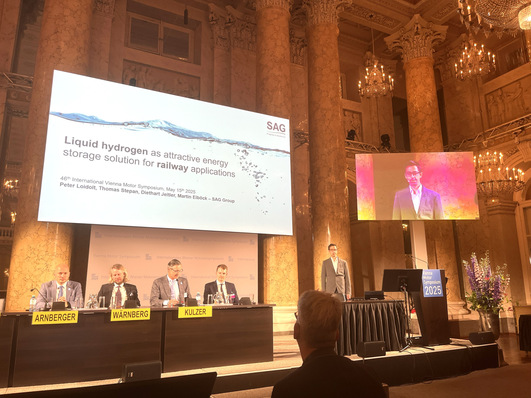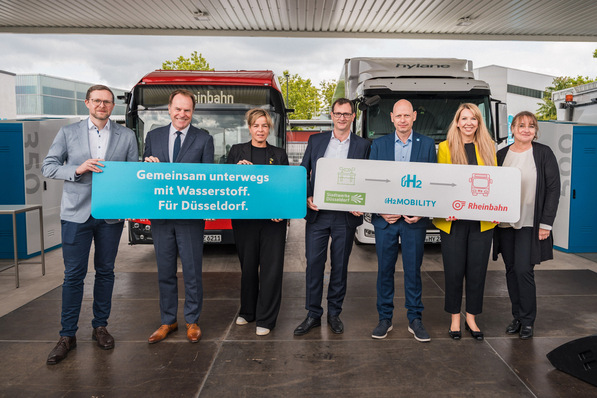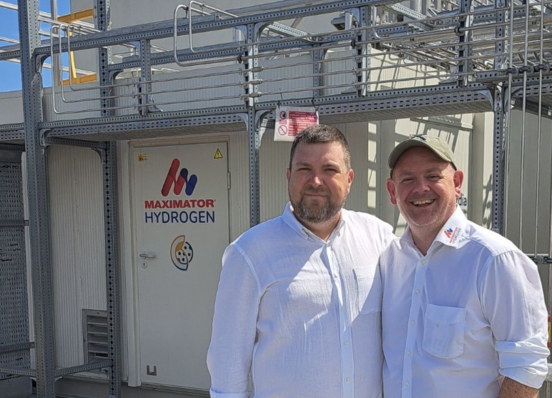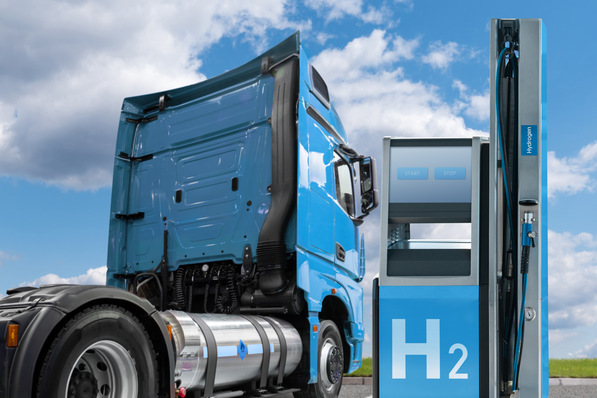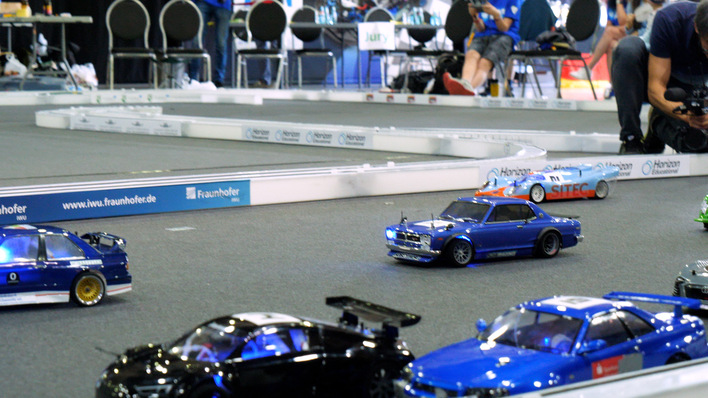In Düsseldorf, H2 Mobility officially opened Europe’s largest hydrogen refueling station at the end of May 2025. It has been in actual operation since early August. The project was funded with €4.3 million through the National Innovation Programme for Hydrogen and Fuel Cell Technology (NIP – Phase II 2016–2026) of the Federal Ministry for Digital and Transport. The total cost of the facility was around €7 to €7.5 million.
Currently, Air Liquide still supplies the hydrogen via 380-bar trailers from its electrolyzer in Oberhausen. However, starting in 2026, hydrogen will be supplied by a 2 MW PEM electrolyzer operated by the municipal utility Stadtwerke Düsseldorf, located nearby. The electricity comes from the adjacent waste incineration plant. Half of it is considered green electricity, as statistics show that about half of household waste consists of biomass.
The main customer for the public H2 Mobility refueling station is Düsseldorf’s public transport operator Rheinbahn, which operates a nearby depot in Lierenfeld. Rheinbahn currently uses 20 Solaris Urbino 12 hydrogen buses and plans to expand its hydrogen fleet to around 30 units. Other users will include municipal service providers, logistics companies, tradespeople, and even private individuals. Specifically, these currently include a waste collection vehicle of the type Enginius Bluepower 2738E 6×2/4 and several Hyundai Xcient Fuel Cell trucks, primarily used by the food retailer Rewe. The station features three dispensers with a total of six nozzles, all of which can be operated simultaneously.
Testing with cold hydrogen
At this station, hydrogen can be refueled at 350 bar (for buses and trucks) and 700 bar (for passenger cars), as well as at 500 bar, cooled to –20°C. The latter is currently available in a test and pilot phase at the same price as 350-bar hydrogen. At present, prices at the Düsseldorf station range from €13.55/kg (350 and 500 bar) to €15/kg (700 bar). However, it should be noted that, according to H2 Mobility, these prices are close to the purchase cost.
The redundant dispensers with cooling unit, hydrogen control system, control unit, and payment system are in-house developments by H2 Mobility. They are equipped with a sliding swing door, allowing the cooling unit to be easily pulled out for maintenance. The entire facility is designed to dispense 2 to 5 tonnes of hydrogen per day, with the future fleet of 30 Rheinbahn fuel cell buses alone accounting for a daily demand of around 750 kg. A special feature is the Hoerbiger compressor developed in cooperation with Ariel. It is the first commercial version, following a prototype previously used by Wiener Linien.
The H2 refueling station on Höherweg is not expected to be the last in the state capital of North Rhine-Westphalia. Another station is planned at Düsseldorf Airport, as revealed by Mayor Stephan Keller during the opening of the H2 Mobility facility at the end of May.
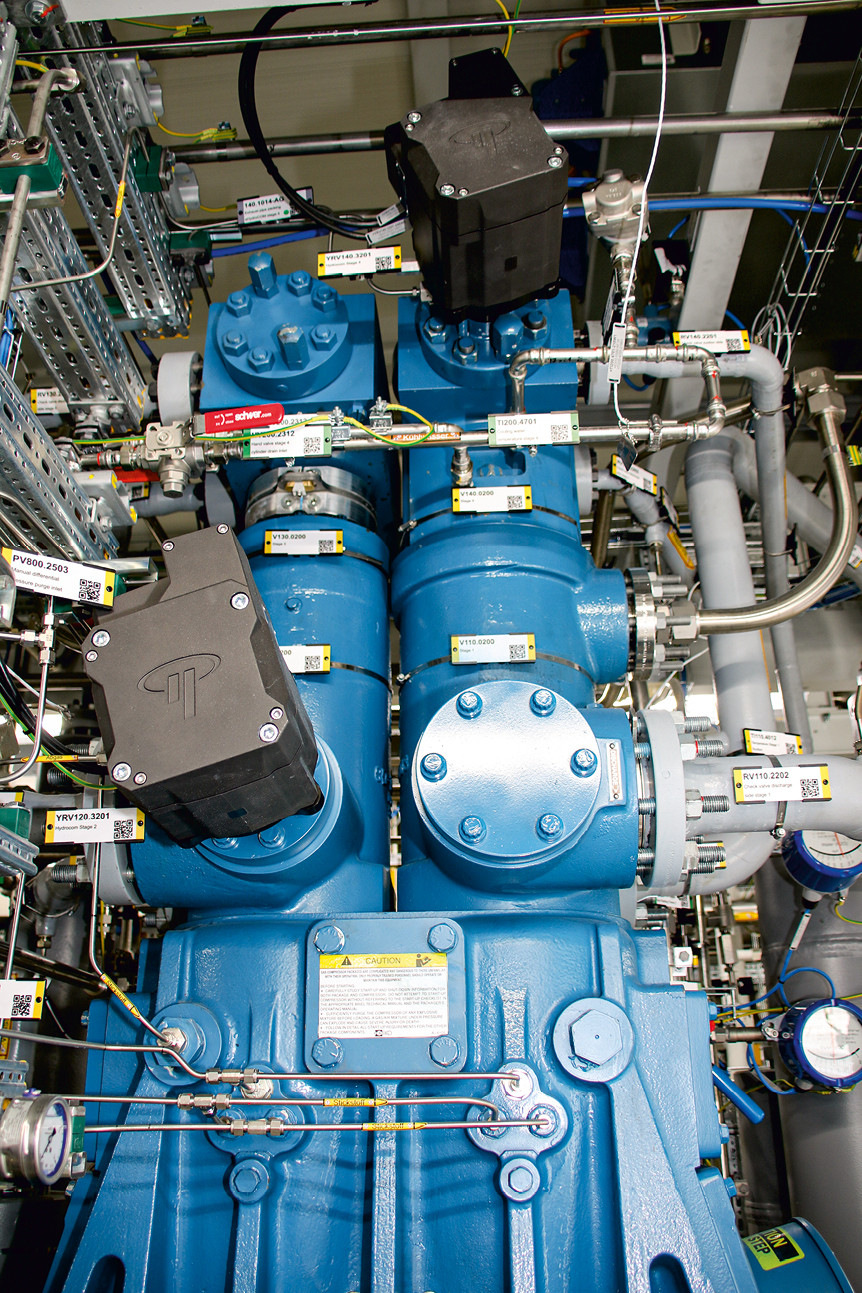
© Claus Bünnagel
Hydrogen fleet in Kerpen is growing – and needs a refueling station
A bit further up the Rhine in Kerpen, on the southwestern outskirts of Cologne, the public transport company REVG Rhein-Erft-Verkehrsgesellschaft is already operating in an environmentally friendly manner. Since the end of 2024, its 111 former diesel buses have been running on HVO100. This already fulfills the quota for clean buses under the EU-wide Clean Vehicles Directive (CVD). However, the CVD also requires that within the 65% quota, 37.5% of vehicles must be zero-emission by 2030. This cannot be achieved with fuel made from hydrotreated oils and fats.
For this reason, the Rhein-Erft district decided back in 2019 to switch to hydrogen buses in the future. In the first phase, 26 Solaris Urbino 12 hydrogen buses were procured, each equipped with a 70 kW Ballard fuel cell. The timing was favorable: the Federal Ministry for Digital and Transport approved funding of €7.48 million before the subsidy program for electric and hydrogen buses was discontinued in early 2024. This corresponds to approximately €288,000 per vehicle, roughly covering the additional cost of the fuel cell buses compared to equivalent diesel models, which REVG Managing Director Walter Reinarz estimates at around €300,000 per unit. The acquisition of seven hydrogen articulated buses is also planned. Together, they are intended to gradually replace diesel vehicles with expiring lease contracts.
Two pressure levels, two storage systems
Naturally, the growing hydrogen bus fleet also requires an appropriate refueling infrastructure. Therefore, by October 2024, a refueling station was built on the REVG depot in Kerpen by the neighboring logistics company Freund. It includes a 900-bar high-pressure storage system with a cooling unit (for temperatures down to –40°C), a 500-bar low-pressure storage system, and a compressor costing €1.5 million on its own. The high-pressure storage can supply only 15 kg of hydrogen fuel but is also used to refuel REVG’s passenger car fleet with 700-bar hydrogen. The buses are refueled from the low-pressure storage, which can hold 50 kg.
To enable refueling of one bus every 20 minutes in the evening after their return from daily routes, the trailer-based hydrogen deliveries by Messer SE from Krefeld – the world’s largest privately owned specialist for industrial, medical, and specialty gases – must be expanded.
So far, two trailers per day deliver hydrogen compressed to 200 bar. One trailer holds 300 kg of hydrogen, enough for 13 buses at approximately 23 kg per bus. Assuming a consumption of 7 to 8 kg/100 km per bus, this allows for a range of 290 to 330 km – roughly the range of many of REVG’s daily routes. The five type-4 tanks on the roof of the Solaris fuel cell buses, with a total volume of 1,560 liters, can hold up to 37.5 kg of hydrogen. When fully refueled, this enables the buses to cover even the 400 km of REVG’s longest daily routes.
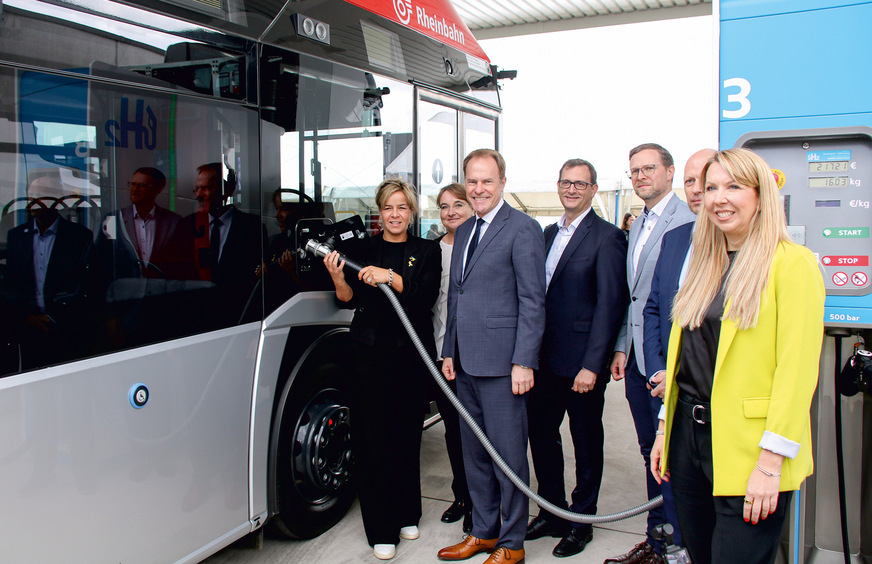
© Claus Bünnagel
New trailers to deliver more hydrogen
According to the original plan, 380-bar trailers were already supposed to be in use. However, technical issues have delayed their deployment – they are now expected to be operational in early autumn. These trailers can transport up to 1 tonne of hydrogen each and eliminate the need for additional compression of the fuel for the buses. To also supply the future hydrogen trucks of Spedition Freund, three such trailer units would be used: one being filled (a process that takes four to five hours), one in transit, and one stationed at the REVG depot at the refueling station.
Until now, the Messer Group has been supplying hydrogen from its production facility on the premises of Rain Carbon in Castrop-Rauxel. However, in early July 2025, ground was broken for a hydrogen facility with a 10 MW electrolyzer in the Brainergy Park Jülich, which is scheduled to begin operation in November. The electrolyzer technology is being supplied by the NEA Group from Übach-Palenberg, while Messer SE will handle the storage and distribution of the hydrogen produced from photovoltaic electricity.
Currently, REVG estimates hydrogen prices at between €14 and €18 per kilogram, in line with market rates. In the future, if large-scale electrolyzers with 25 MW capacity, such as those planned in the Belka project, can be used, prices in Frechen are expected to drop to €9 to €10 per kilogram, plus distribution and delivery costs.
In-house construction or turnkey solution
Hürth is entirely different. Both are pioneers in hydrogen mobility in public transport. However, they pursue two different approaches. The two new hydrogen refueling stations in Mechernich and Bergisch Gladbach are being built and operated by the transport company itself at its own depots. They will be equipped with 2 MW electrolyzers to use electricity from wind and PV systems for in-house hydrogen production.
The situation is different in Meckenheim and Hürth, where significantly more vehicles will need to be supplied than in Bergisch Gladbach and Mechernich. In these cases, land was sold by the two cities to RVK and Stadtwerke Hürth with the condition that other users must also have access to the hydrogen refueling stations – from municipal service providers and logistics companies to bus operators and private individuals with passenger cars. Following a tender process, Air Products was awarded the lease for the respective sites and is responsible for the entire process – from obtaining permits to construction, future operation, and hydrogen supply for the publicly accessible refueling stations. In other words, it is a turnkey solution for RVK and Stadtwerke Hürth.
The design of the two new stations in Meckenheim and Hürth differs fundamentally from RVK’s previous depot-based refueling model. Hydrogen is supplied by Air Products from its own sources using new 640-bar trailers. This supply solution eliminates the need to compress the hydrogen to 350 bar, as – simply put – the hydrogen flows directly from the trailer to the dispenser via pressure equalization.
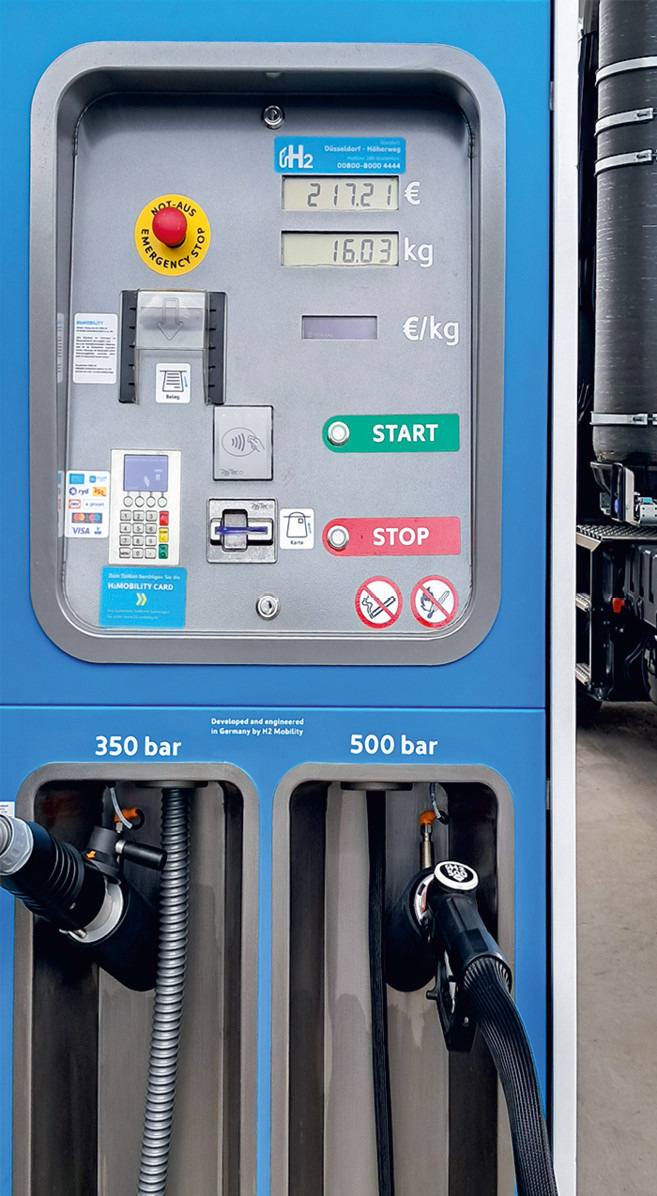
© Claus Bünnagel




